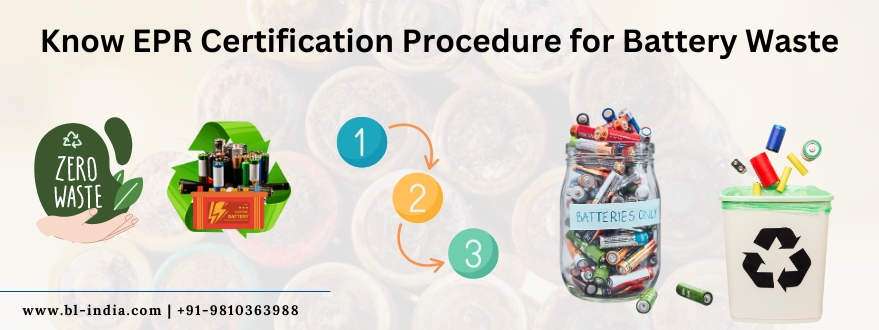
In the era of technological advancements and increased reliance on electronic devices, the management of electronic waste has become a critical concern. Among the various components of E-waste, batteries pose a unique challenge due to their potential environmental impact.
Recognizing the need for responsible disposal and recycling, the Indian government has implemented Extended Producer Responsibility (EPR) regulations to ensure that manufacturers take accountability for the entire lifecycle of their products.
Let's discover the process of obtaining an EPR Certificate for battery waste in India.
Extended Producer Responsibility (EPR) Authorization for battery waste in India is a regulatory framework established under the Battery Waste Management Rules of 2022, implemented by the Ministry of Environment, Forestry, and Climate Change under the Environment (Protection) Act of 1986, replacing the previous Battery (Management and Handling) Rules of 2001.
These rules encompass a comprehensive approach to managing various types of waste batteries, including used or end-of-life batteries, pre-consumer off-spec batteries, expired batteries, and user-discarded batteries, regardless of whether they are hazardous or non-hazardous in nature.
It provides detailed guidelines for the management of different categories of batteries, such as electric vehicle batteries, portable batteries, automotive batteries, and industrial batteries.
Manufacturers seeking EPR Authorization are required to comply with these regulations, which include establishing collection centres, implementing recycling mechanisms, adhering to prescribed disposal guidelines, ensuring responsible waste management practices and contributing to environmental sustainability.
The Battery Waste Management (BWM) Rules of 2022, as outlined in Rule 4, mandate that every producer and entity involved in battery manufacturing must register with the Central Pollution Control Board (CPCB) through a centralized online portal.
This registration process requires submitting an application in Form 1(A) to the CPCB. Producers are also obligated to apply for the renewal of their registration using the same form at least sixty days prior to its expiration.
The BWM Rules define a producer as an entity engaged in the manufacturing, selling, or importing of batteries, including refurbished batteries, either under its own brand or produced by other manufacturers or suppliers.
The core principle underlying the BWM Rules is Extended Producer Responsibility, wherein battery producers are responsible for the collection, recycling, and refurbishing of waste batteries, utilizing recovered materials to manufacture new batteries.
This responsibility aims to ensure environmentally sound management of waste batteries, safeguarding human health and the environment from any adverse effects of substances contained in them.
Refurbishers and recyclers are required to register with the State Pollution Control Board through the centralized portal for a one-time registration to operate in compliance with the regulations.
In India, EPR Certification for battery waste holds significant importance in several ways, such as:
The Battery Waste Management Rule, 2022 stipulates that various entities involved in the collection, recycling, sorting, transportation, and refurbishment of battery waste are eligible to apply for an EPR Certificate. These entities include:
Manufacturers seeking an EPR Certificate for battery waste can follow these steps:
Step 1: Prepare the necessary documentation, including details about the manufacturer, types of batteries produced, and proposed plan for battery waste management.
Step 2: Submit the application to the State Pollution Control Board (SPCB) or the Pollution Control Committee (PCC) in the respective state where the manufacturing unit is located.
Step 3: Await assessment and approval from the regulatory authorities.
Step 4: Upon approval, the regulatory authorities will issue the EPR Certificate for battery waste.
The Registered Producers must adhere to the following conditions:
EPR Certification for battery waste will be issued for a specific period, i.e., 5 years, after which it needs to be renewed. Manufacturers must apply for renewal within the stipulated time frame and demonstrate continued compliance with the EPR requirements, such as:
In such cases, the CPCB reserves the right to suspend or cancel the battery EPR Registration and impose Environmental Compensation on entities.
Note: An opportunity will be provided to the applicant to present their case within 15 days from the issuance of the notice before CPCB considers the cancellation or suspension of Battery EPR Registration.
Obtaining an EPR Certificate for battery waste in India is essential for manufacturers to fulfil their environmental responsibilities and contribute to sustainable waste management practices.
As a leading compliance consultant company, Brand Liaison understands the complexities involved in obtaining an EPR Certificate and is dedicated to providing manufacturers with the assistance and support needed to streamline this process.
By leveraging our expertise and resources, manufacturers can obtain their EPR certificates easily and quickly, allowing them to focus on their core business activities while contributing to a cleaner and healthier environment.
Our commitment to excellence and client satisfaction ensures that manufacturers receive tailored solutions that meet their specific needs, facilitating the attainment of EPR certificates for battery waste in India in a seamless and efficient manner.